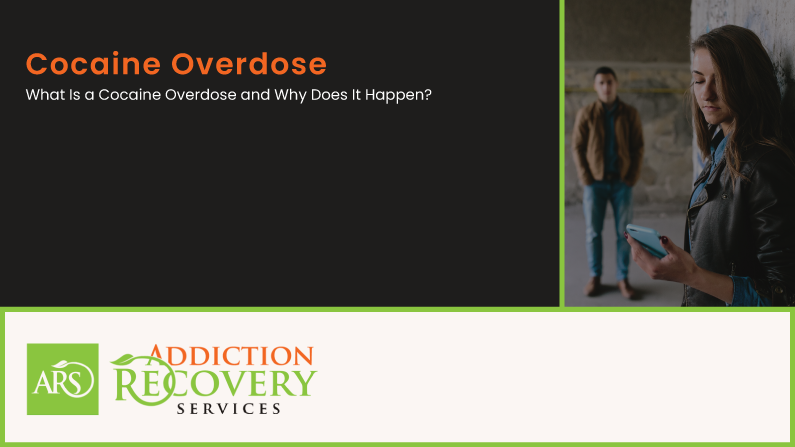
After you watched your parents take cocaine growing up, it didn’t seem like a big deal to start using it yourself once you reached adulthood.Over the years, you had used it often enough that you had built up a tolerance to cocaine. So, you decided to increase your cocaine use one night after work in your car.
However, when you woke up the following day, you found yourself in a hospital room. The doctor informed you that you had experienced a heart attack that came from a cocaine overdose. He urged you to seek treatment to prevent further heart attacks and overdoses. The experience had an impact on the thoughts in your mind, but you figured that with your job, you wouldn’t have the time to seek treatment for a cocaine use disorder.
In 2020, 3,460 people died from cocaine overdose in New Hampshire. At Addiction Recovery Services, we offer an intensive outpatient program (IOP) that is flexible for both students and workers. This flexibility can allow people to maintain their lives while also giving them the help they need for cocaine use, which can prevent a cocaine overdose.
What Is a Cocaine Overdose and Why Does It Happen?
Table of Contents
Coming from the coca plant in South America, cocaine is a stimulant that overuse can result in life-threatening consequences. One of those life-threatening consequences is overdose. A cocaine overdose happens when someone binges on cocaine, intending to make the “high” from cocaine last longer. However, when the body experiences this much cocaine, it can get overwhelmed. Because cocaine is a stimulant, it can result in a rapid heart rate and shallow breathing, which can be dangerous.

Cocaine Overdose: Signs & Symptoms
There are several signs that someone might display if they are experiencing a cocaine overdose. Here are a few of the signs and symptoms:
- Hypertension
- Chest pain
- Headache
- Hyperthermia
- Blurry vision
- Paranoia
- Seizures
- Vomiting
- Elevated heart rate
- Pale skin
- Enlarged pupils
- Restless behavior
Understanding the Risks of a Cocaine Overdose
Large doses of cocaine can be dangerous and impact the body in multiple ways. For example, heart attacks are a common occurrence during a cocaine overdose. Heart attacks occur because cocaine can elevate your blood pressure and raise your heart rate. These factors make your heart work faster and harder, which may result in a heart attack. Other conditions that might come from a cocaine overdose include strokes and seizures.
Cocaine is not regulated, which means dealers might mix it with another substance, such as fentanyl, to make the high from cocaine stronger and last longer. The combination of cocaine with another substance can result in life-threatening circumstances to the heart and other organs. Thus, it increases the need for medical intervention.
What to Do If You Witness a Cocaine Overdose
Before you do anything else, you should call 911. Getting help in time will give your loved one a much better chance at recovery. You will also want to stay on the phone to update the 911 operator on any changes. Follow any instructions they give you based on the information you give them. It is also essential to keep the person awake while you wait for first responders to arrive. If they do pass out, turn them to the side to prevent choking if they were to vomit. You also want to make sure they are on the ground and in an area where they cannot injure themselves in the case of a seizure. If they do not have a pulse, performing CPR can be vital in saving their life. However, the most important thing to remember is to remain calm. Help is on the way.
Who Is More Likely to Experience a Cocaine Overdose?
A cocaine overdose can happen to anyone who uses cocaine. It can even happen if you only use it one time. Taking more cocaine than your body can handle, whether it is your first time taking cocaine or you have built a tolerance and are increasing your dosage, will allow the possibility of an overdose to happen. However, even if someone has taken that much cocaine before, it can still result in an overdose.
Other times, elements, such as age or medical conditions, can also play a role in the development of a cocaine overdose. Younger people are more likely to experience a cocaine overdose because they are at a higher risk of developing a cocaine use disorder. Likewise, health conditions, such as a heart condition, may result in a cocaine overdose when taking cocaine. These health conditions may have resulted from long-term cocaine use or conditions that exist outside of cocaine use.
If you or your loved one is experiencing an overdose, receiving help in time can allow them to have a successful recovery. A cocaine overdose doesn’t have to be the end of the road for someone. Recovering from a cocaine overdose with adequate help is possible, and it is also possible to still recover from a cocaine use disorder even if you have experienced an overdose.
Cocaine Overdose Risk Factors
However, several factors can contribute to the likelihood that someone will experience an overdose. Many people will experience a cocaine overdose if they experience a return to use following cocaine use disorder treatment. It is also possible to experience a cocaine overdose if someone combines cocaine and other substances. The combination of substances can result in a cocaine overdose because this practice can be unpredictable. If they were exposed to cocaine at a young age, either by peers or family members, they might be more likely to engage in cocaine use or experience an overdose. Mental health conditions or past trauma may also increase cocaine use. In contrast, physical health concerns may not mix well with cocaine use, resulting in the possibility of a cocaine overdose.

Treatment Options for Cocaine Use in Greenland, New Hampshire
The best way to avoid a cocaine overdose is to seek cocaine addiction treatment. Asking for help may be a difficult task for anyone, and those who are experiencing a cocaine use disorder might have a more difficult time. It may feel like cocaine is controlling their life even if they realize the potential for danger when it comes to overdose. By choosing to seek help for a cocaine use disorder, people can find their inner strength and develop foundations that will allow them to be successful in their recovery.
Located in Greenland, NH, Addiction Recovery Services provides multiple pathways to recovery. We address mental health concerns through specific programming and have psychiatric appointments available. For more information or to start cocaine use disorder treatment, call us at 978-228-5853 today.
